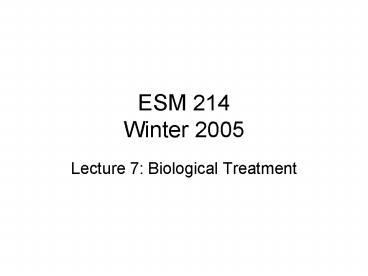ESM 214 Winter 2005 - PowerPoint PPT Presentation
1 / 17
Title: ESM 214 Winter 2005
1
ESM 214Winter 2005
- Lecture 7 Biological Treatment
2
Biological Treatment
- Transform organics into end products
- New biomass (sequestration)
- CO2, H2O, nutrients, gas and other
- Capture solids in biological floc
- Removes nutrients (P N)
- Removes trace organics
3
Biological Trmt Processes
- Activated sludge (in secondary treatment)
- Fixed film treatment (attached growth)
- Trickling filters
- Rotating biological contactors
- Aerobic digestion
- Anaerobic Digestion
- Lagoons
- Aerated
- Non-aerated
4
Biological Reactions in Aerobic Treatment
Oxidation
Synthesis food(COHNS) O2 energy
C5H7NO2
Endogenous respiration C5H7NO2 5 O2 ? 5CO2
2H2O NH3
overall
food (COHNS) O2 CO2 H2O NH3
products C5H7NO2
5
Stoichiometry in Biological Trmt
- Useful in estimating proportions
- 1. Yield Y
- 2. Oxygen demand
- 3. Nutrient requirements
6
Microbes Need (a review)
- Source of C
- CO2 autotroph
- Organic compounds heterotroph
- Source of energy
- Sunlight phototroph
- Chemicals chemotroph
- Electron acceptor
- Electron transport phosphorylation (ETP)
- Molecular oxygen aerobe
- Not oxygen (e.g. NO3-) anaerobe
- Substrate level phosphorlyation
(fermentation)substrate
7
Microbes need (a review, cont.)
- Nutrients
- Macronutrients N, P, K, etc.
- Trace elements Mn, Mg, etc.
- Environmental Conditions
- Temperature
- Psychrophiles -10 to 20 C
- Mesophiles 10 to 50C
- Thermophiles up to 140 C
- pH
- Acidophiles generally below pH 7
- Alkalophiles above pH 7
8
Bacterial growth
- In well-mixed system with no nutrient
limitations, its first order - Where X biomass concentration, m specific
growth rate (1/t)
9
Bacterial Kinetics
- Varies with
- Microbes
- Substrate (s)
- Concentration
- Temperature
- Described by
- Monod eqn (growth)
- Michaelis Menten (no growth)
10
Kinetics
- Monod growth
- Yield Y
- substrate utilization rate
11
Kinetics
Observed Growth (7-21)
12
Mass Balance Suspended Growth Biological
Treatment
- CFSTR or plug
- flow aeration basin
- RAS
- WAS
- No influent biomass
- Well-mixed, aerated
13
Mass Balance Biomass
Solids retention time (a.k.a. MCRT)
SRT is the average time solids are in the system.
SRT is a design criteria.
14
Suspended Growth Biological Treatment
- Mass balance-based relationships used in
operation /design - SRT
- X
- F/M also use in operation and design
- SRT 20 to 30 days, F/M 0.1 to 0.05
- SRT 5 to 7 days, F/M 0.3 to 0.5
15
Process Selection Considerations What type of
reactor when where? (ME table 4-11)
- Has to be applicable (worked before)
- Will work for characteristic flows, waste
- Will enable meeting treatment goals
- Fit with upstream/downstream processes
- Resource needs (capital , chemicals, energy,
personnel, OM, life cycle, site) - Reliability
- Ease of use (operability)
- Expected life
16
Process Sizing Depends on
- Process goals
- Flow and mass loading (Q, C, etc.)
- Reaction kinetics
- right math expression for r
- rate constant (k or other)
- temperature
- concentration of reactants
- Planning (future growth, current redundancy)
17
Pilot Testing
- Processes are frequently pilot tested to
- Determine if the process is right
- Demonstrate performance on small scale
- Gather better cost data
- Gather criteria for large scale design and
operation































